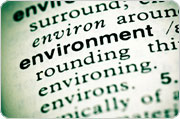Eco-Dictionary
Eco-Dictionary
Environmental Icons and Terminology

Bio-gas? ISO14001 ? Green washing? No, it's not a foreign language. These are commonly used terms in the world of environmentalism. We've made it easy to help you better understand what being green is all about by highlighting some key phrases.
Biodegradable Products Institute (BPI) Compostable Certification
The Biodegradable Products Institute (BPI) Compostable certification means that products meet ASTM D6400 or D6868 standards for biodegradability when composted.
Carbon Dioxide (CO2)
A gas that is emitted when organic matter decays, during animal respiration, and when fossil fuels like coal, oil, and natural gas are burned. CO2 from the burning of fossil fuels is the primary greenhouse gas contributing to global warming.
Carbon Footprint
Refers to the amount of carbon that a product, service, event, or person emits over a given time frame, usually expressed in pounds or tons of carbon dioxide (CO2). The average American has a carbon footprint of 20 tons of CO2 annually.
Carbon Neutral
Neutralizing greenhouse gas emissions that are generated from making a product or providing a service by investing in "carbon offset" projects - like planting trees - that remove an equivalent amount of greenhouse gas emissions from the air.
Carbon Offset / Carbon Credit
Carbon offsets or carbon credits are "credits" received for supporting carbon emission reduction projects elsewhere (planting trees, energy efficiency upgrades, etc.)
Chlorine Free
Paper products manufactured and brightened without chlorine or chlorine byproducts.
Climate Change
A term used to imply a significant change from one climatic condition to another. Often used synonymously with "global warming".
Eco-Friendly Products
Products that have a reduced impact on the environment when compared to conventional products.
ENERGY STAR®
An international standard for energy efficient consumer products. Devices carrying the ENERGY STAR® logo, such as computer products and peripherals, kitchen appliances, buildings, and other products, generally use 20%-30% less energy than required by federal standards.
Environmentally Preferable Products (EPPs)
Products that have a reduced impact on the environment when compared to conventional products.
Forest Stewardship Council™ Certified
The Forest Stewardship Council (FSC) is a nonprofit organization devoted to the responsible management of the world's forests. The FSC logo indicates wood products that come from responsibly managed forests.
Fossil Fuels
Remains of ancient plant and animal life that are used to provide energy by combustion, such as coal, oil, and natural gas. Fossil fuels are not renewable resources.
Global Warming
An increase in the near surface temperature of the Earth due to an increase in greenhouse gases in the atmosphere. There is broad international scientific consensus that human activities and development is responsible for the global warming the Earth has experienced since the industrialized world began, not natural causes.
Green
A product or service that is environmentally beneficial. For example, "green" products are items that have reduced environmental products compared to "typical" products.
Greenhouse Gas
Any gas that absorbs infrared radiation in the atmosphere and contributes to global warming. Many greenhouse gases (including carbon dioxide, methane, and nitrous oxide) occur naturally, but many are also generated in large quantities due to human activity, such as fuel consumption, agriculture, and deforestation.
Non-Renewable Resource
A resource that is not capable of being naturally restored or replenished within a time frame relevant to humans. Examples include minerals, metals, and fossil fuels. Some of these resources are more scarce than others but all are finite.
PVC
Poly-vinyl chloride is a common form of plastic that is durable, inexpensive, and adaptable to a number of different product uses. However, the manufacturing and incineration of PVC releases dioxin, a widespread toxic compound linked to cancer and other diseases.
Post-Consumer Recycled Content
Material that has completed its lifecycle as a consumer products and is composed partially or wholly from recycled material. Paper used by an office and then recycled is considered a post-consumer material.
Pre-Consumer Recycled Content
Refers to waste from a manufacturing process that has been collected, processed, and recycled into new materials or products before ever going to a market.
Rapidly Renewable Materials
Material considered to be an agricultural product, both fiber and animal, that takes 10 years or less to grow or raise, and to harvest in an ongoing and sustainable fashion.
Recyclable
A term used to designate that a product or its package can typically be recycled by the consumer.
Recycled Content
The amount of pre- and post-consumer recycled content used in a material (usually shown as a percentage). The recycled "chasing arrow" icon is used to show that a product or package is made from recycled content.
Refillable
An item is refillable if a part or component of the product can be replenished to return the product to active use. Refillable items are more eco-friendly because instead of discarding an entire item, you are only discarding the portion that has expired.
Renewable Resource
A resource that is capable of being naturally restored or replenished if it is managed or harvested properly. However, many renewable resources on Earth are being depleted at a much faster rate than they can be restored or are significantly degraded.
Source Reduction
Reducing the amount and/or toxicity of an item before it is ever generated (e.g. buying an item with less packaging, using a non-toxic alternative to clean with).
Sustainability
From a business standpoint, a commitment to sustainability means explicitly taking into account the environmental and social impacts of business operations and taking action to eliminate all negative environmental, social, and economic impacts of operations.
Virgin Product
Term that refers to products that are made with 100 percent new "virgin" raw materials and contain no recycled materials.
